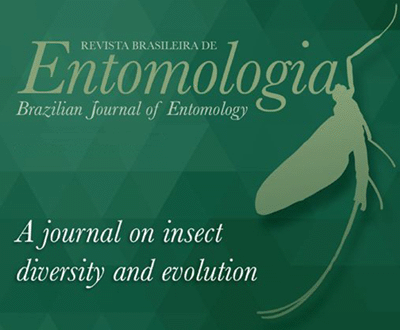ABSTRACT
The dispersion of Diceraeus melacanthus (Dallas) from soybean (first crop season) to maize (second crop season) is facilitated by the presence of weeds (e.g. Commelina benghalensis) and soybean grains on the ground. Understanding insect development and behavior on different food sources is important to develop pest management strategies. Thus, three independent experiments were conducted to study D. melacanthus nymph development, and adult preference for feeding and oviposition in different food source scenarios in the field. The first two trials studied development and food preference of D. melacanthus related to different food sources (C. benghalensis branches, moistened soybean grain + soybean seedlings, maize seedlings + C. benghalensis branches, moistened soybean grains + maize seedlings, moistened soybean grains + C. benghalensis branches, maize seedlings, as well as a standard diet). The third trial evaluated D. melacanthus oviposition preferences between the aforementioned plants. Overall, moistened soybean grains resulted in better nutritional quality, thus being crucial for D. melacanthus development, triggering faster nymph development as well as better overall adult fitness. The combination of soybean grains and maize seedlings or C. benghalensis branches showed great potential to benefit D. melacanthus, since these complementary food sources improved stink bug fitness, increasing mainly adult longevity, fecundity and egg viability. Therefore, it can be concluded that in order to reduce D. melacanthus outbreaks in second season maize, it is important to reduce soybean harvest loss (reducing, therefore, moistened soybean grain on the ground) and eliminate stink bug associated plants like C. benghalensis.
Keywords:
Green-belly stink bug; Green bridge; Host plants; Food preference

 Thumbnail
Thumbnail
 Thumbnail
Thumbnail
 Thumbnail
Thumbnail
 Thumbnail
Thumbnail



